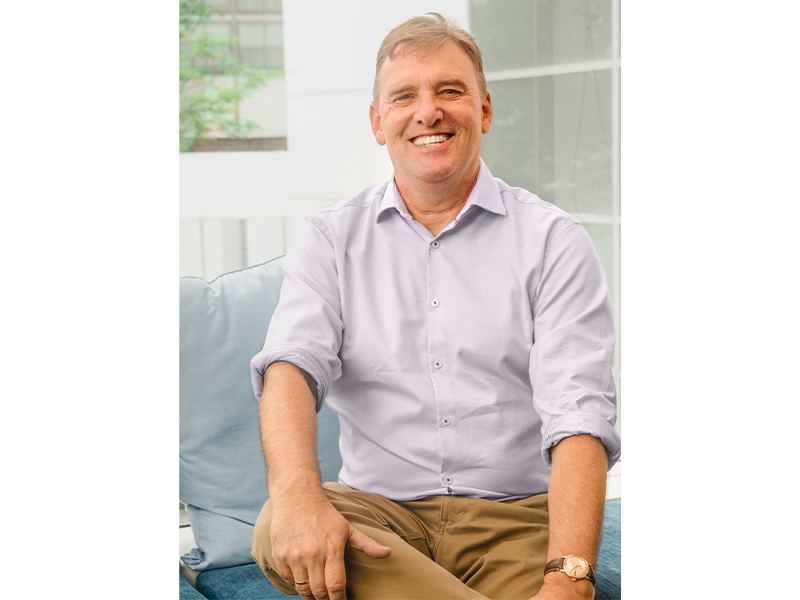Don’t be surprised to find that your addiction therapist was once a person struggling with addiction. Many become therapists themselves to help others to recover. ANDY LEACH, principal therapist at Visions, has been there.
An addiction is an insidious destroyer of lives. And not just of the victims but those of significant others, family and friends, and livelihoods. What starts as a “social” foray for stress release, whether it’s drugs, alcohol or sex, soon turns into the taboo – something you know is wrong and having a bad effect on your life, but is now out of your control.

A person struggling with addiction is driven by the reward-seeking part of the brain where sense no longer makes sense and he or she is now in pleasure-seeking autopilot mode.
Andy Leach was once in a similar state, decades ago in a previous life. It’s a fact he isn’t ashamed to share with those he meets and treats, to show them that anyone can change their life. He leads the Intensive Outpatient Programme at Visions by Promises Healthcare.
What happens when someone is addicted
“In addiction, brain activity is primarily in the mid-brain, where you are survival-oriented,” says Andy. “The pre-frontal cortex that is used for reasoning and logic stops functioning optimally and switches to reward-seeking mode, where you are pleasure-seeking, and no longer thinking of consequences.”
He adds that, despite this, getting off drugs or alcohol can be quite straightforward. “We detox the client and teach them tips to stay clean and sober. We work on all areas of their lives to help them get back on track.”
The decision to work with an addiction therapist is not an easy one. It’s a path that sometimes a person takes after every aspect of their life has fallen apart and there are no other options. Visions works with various hospitals and rehabilitation centres to admit clients into detox programmes locally or abroad, if they are assessed to be unable to remain clean and sober in their home environment.
Each addiction has its own difficulties and comes with individualised treatment plans. Andy explains: “A thorough assessment is first made using a biological, psychological and social tool to see what level of care they need. Sometimes a psychiatrist may prescribe a relatively mild outpatient detox.”
Addictions you may not think of first
The hardest addictions to kick, surprisingly, aren’t always drugs or alcohol. A gaming addiction can be just as hard to overcome as heroin.
Gaming addiction is described in the international classification of diseases as a behavioural addiction. Clients at Visions tend to be students gaming 12 to 14 hours a day, and not eating or taking care of themselves. They have conflict with family members who try to intervene.
Andy says, “It’s very difficult for them to get on the computer to study or do homework instead of straying off into a game.”
Another behavioural addiction is pornography, when it becomes no longer a choice but rather habitual. This addiction that isn’t helped by the fact that it’s so easily available on so many platforms.
Achieving a breakthrough
“First of all, far from the homeless street junkie many of us picture, people struggling with addiction come from all walks of life and from all industries,” says Andy. “Addictions can be expensive, and we see many well-heeled professionals in treatment as well. They’re self-medicating a variety of underlying symptoms, doing anything they can to manage how they feel, except the right thing.”
The worst thing you can do is avoid treatment because of the imagined stigma. Andy says, “The stigma doesn’t have to be there. We remind our clients that there are reasons why they have become addicted, and that our job is to work on those reasons to achieve a breakthrough. You don’t have to hit the proverbial rock bottom to go into treatment. We just need to help you find the inspiration to go on.”
How Visions helps with addiction
The Intensive Outpatient Program at Visions addresses all the dimensions of the client’s life, including biological, psychological, social and spiritual aspects, assessing the client’s mental and emotional states along the way to assess progress and areas where more help is needed.
Mental health aspects are addressed through psychiatry, psychology and therapy, and teaching clients how to reconnect with others, not just in one-to-one therapy but in groups as well. Group therapy can be extremely beneficial.
“They already feel ashamed and disappointed in themselves and will find it difficult at first to even fathom group therapy,” says Andy. “However, in a group, a client realises that we are all broken here, to greater and lesser extents. They start to appreciate a shared goal with other people. This can cause a tremendous shift in their healing.”
He adds that socially anxious people can learn to be with other people in groups. “They see that they are treating their anxieties with addictions and self-medicating behaviours just like others. This helps clients to recognise it, normalise it and say I’m not alone. It’s incredibly freeing.” Physical exercises such as yoga and trauma-release exercises are recommended to help clients reclaim their body, along with their minds. Emotional contexts are unpacked through connections, rebuilding relationships with family and friends, and through dialectic behavioural therapy to learn about emotional regulation.
Self-medicating can stem from feelings of anger and anxiety. “When a person is self-medicating,” says Andy, “they are missing a piece of their puzzle, whether it is meaning in life, a purpose or a connection. Most suffer feelings of isolation and loss, sometimes of everything they’ve banked their lives on. They need to feel inspired again.”
Experiential therapy includes psychodrama, art therapy and creating a vision to give clients something to aim for, and to show them how their life is going to be once they give up their addiction.
Motivated to make change
Andy has over 15 years of experience as a therapist here and abroad. “Lives changed, families reunited, reconnecting with children – repaired lives; this is why I do the work. Being a wounded healer gives me empathy and knowledge about what addiction feels like and helps me as a therapist.”
He adds, “Most clients who come to us are just sick and tired of being sick and tired. You don’t have to reach that point to get help. Find the inner resolve and motivation to change. I know we can help you.”
He says his favourite part of treatment is working with families to teach them about addictions, how to support the client and how to support themselves. “We never look at the individual as an isolated case. Addiction doesn’t only affect the individual, but it can affect everyone they come into contact with.”
Andy is the author of a handbook, Your Recovery Journey Begins Here, that comes with the Intensive Outpatient Program at Visions. The program lasts 12 weeks with 36 group sessions and 12 one-to-one sessions, and costs $4,680.
Visions by Promises Healthcare
#11-15/16 Novena Medical Centre, 10 Sinaran Drive
6397 7304 | visionsbypromises.com.sg
This article first appeared in the July 2023 edition of Expat Living. You can purchase the latest issue or subscribe, so you never miss a copy!
To make the most of living in Singapore, read our latest City Guide here for free!
Don't miss out on the latest events, news and
competitions by signing up to our newsletter!
By signing up, you'll receive our weekly newsletter and offers which you can update or unsubscribe to anytime.



